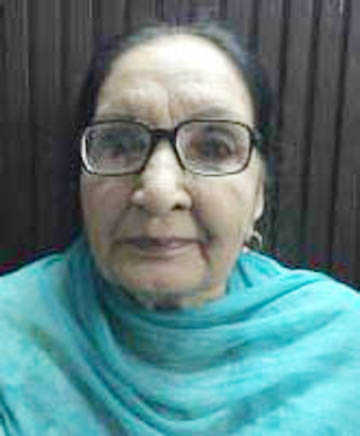
A Fine balance: Dalip Kaur Tiwana
Rana Nayar
Dalip Kaur Tiwana is a well-known signature in Punjabi literature. With as many as 40 novels and a string of awards, including the prestigious Saraswasti Sanmaan, to her credit, she hardly needs an introduction.
Tiwana is a feminist, who, in her writings, casts a critical, scrutinising gaze at the feudal, patriarchal Punjabi society. However, her brand of feminism is not over-the-top or strident, but persuasively gentle, often muted. For, she is a novelist of the inscapes, and invariably portrays a landscape of a woman’s heart or mind, with a sense of fidelity, even felicity.
Originally titled Kaho Katha Urvashi, and published in Punjabi in 1999, this novel has recently been made available to a much wider, English readership. Ordinarily, while reading a translation, one always has this nagging sense of unease that it is a work of translation and so one must approach it gingerly, even diffidently.
Not so for this particular translation. It is so fluid and smooth that it almost gives the impression of having been originally conceived and written in English. For this, credit must be given to the translator and his editor, Elizabeth A. Siler, whom Bhupinder Singh, in his Translator’s Note, has acknowledged as a “co-translator” (xi).
Dalip Kaur is known for writing novellas, which ordinarily don’t exceed 150-odd pages, and it is perhaps for the first time ever that she has conceived a narrative of epic proportions. Though inspired largely by two autobiographical, tragic incidents, Tell the Tale Urvashi is epical not only in its magnitude and scale, but also in its structuring of thought and vision.
It is a tragic tale of how the only brother of three sisters, Devinder, a sensitive army Major, is unable to cope with the stress of his marriage slowly falling apart, and finally kills himself. It’s a story of how love goes hopelessly awry, and how Devinder’s sudden suicide takes its toll on several lives connected with him.
It is often said that a suicide not only kills the one who commits it, but also permanently scars and cripples the ones left behind. Forever caught in a complex web of guilt, grief, extreme helplessness and utter despair, the family suffers its worst trauma by never being able to answer for itself this ever-haunting question of ‘why’ it so happened.
Running close to the author’s own life, the story had all the potential to turn egregiously personal, even overtly melodramatic. Not so for Dalip Kaur. A seasoned story-teller, with deft control, she has not only crafted a complex narrative out of a personal tragedy, but also woven a fine tapestry of wide-ranging human emotions, without, in the least, going for the overkill. And this is where the universal appeal of this novel essentially lies.
More than a mere personal tragedy, this is a story of how a joint family collapses under its own multiple strains and contradictions. Going beyond the personal and the familial, Dalip Kaur explores the existential and the societal, too. For she offers us some rare, penetrating insights into how a putrefying feudal structure of a typical Jat family from Patiala, first crumbles, and then falls into slow ruins, leaving a vast, unending trail of emptiness behind.
Tell the Tale Urvashi raises more questions than it answers, which does speak for the compelling power and enduring appeal of this well-churned narrative. Not only does it grapple with the earthy dilemmas and conflicts we often face in this material world, but it also captures, with rare precision, the undying longings and yearnings we sometimes harbor for the eternal, spiritual world that forever eludes us.
While exploring the complex theme of death, this novel goes back to the ancient wisdom of the Upanishads, invoking philosophical questions centred around self, being, human existence, and our troubled relationship with other beings, society, time, nature, even god.
While reading this novel, I was constantly reminded, in more ways than one, of some of the great works I have read on the subject of life and death, such as Tolstoy’s The Death of Ivan Ilyich, Marcel Proust’s Remembrance of Things Past, William Faulkner’s As I Lay Dying, Roland Barth’s Mourning Diary and Randy Pausch’s The Last Lecture.
In her tone and tenor, Dalip Kaur may have a distinct flavour of her own, but in her treatment of the subject-matter, she is as accomplished as the masters. Tell the Tale Urvashi is, indeed, her masterpiece — a tale that may ultimately assure her a safe berth among the modern, if not the world, classics.



























